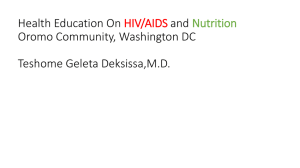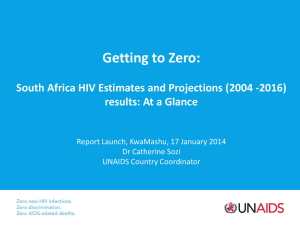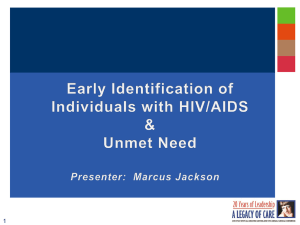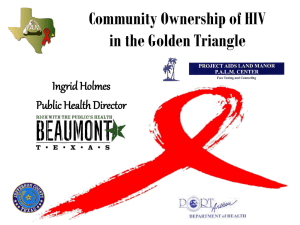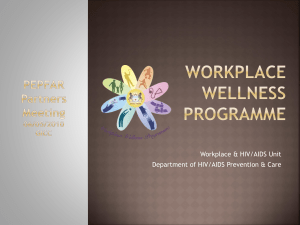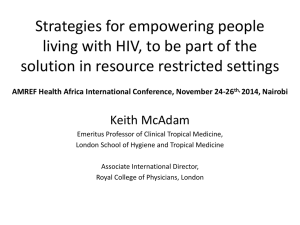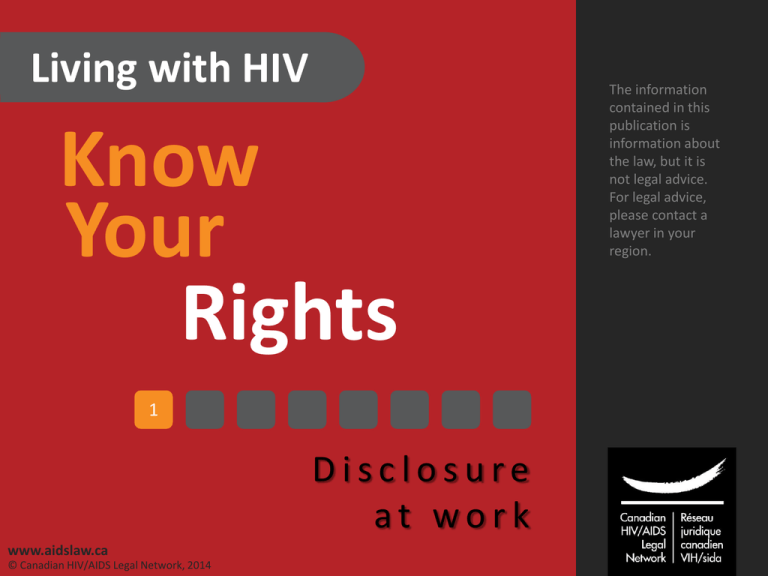
Living with HIV
Know
Your
Rights
1
Disclosure
at work
www.aidslaw.ca
© Canadian HIV/AIDS Legal Network, 2014
The information
contained in this
publication is
information about
the law, but it is
not legal advice.
For legal advice,
please contact a
lawyer in your
region.
Introduction
This presentation complements the brochure Living with
HIV: Know your Rights #1 Disclosure at Work.
Copies of the brochure are available at www.aidslaw.ca.
The information contained in this presentation is
information about the law, but it is not legal advice. For
legal advice, please contact a lawyer in your region.
The information contained in this presentation is current as
of 2013.
Funding for the Living with HIV: Know your Rights series was
provided by the Public Health Agency of Canada. The opinions
expressed in this presentation are those of the authors/researchers
and do not necessarily reflect the official views of the Public Health
Agency of Canada.
www.aidslaw.ca
© Canadian HIV/AIDS Legal Network, 2014
1. Do I have to tell my employer that I have HIV?
• In most cases, you do not have to tell your employer or anyone you work with
that you have HIV.
• Whether or not you disclose your HIV status at work, and to whom, should be
entirely up to you.
• Almost all jobs pose no real risk of transmitting HIV to anyone else. Therefore,
you have no legal obligation to disclose your status.
• If you work in a health care setting, there may be some exceptions to this
general rule that you don’t have to disclose.
www.aidslaw.ca
© Canadian HIV/AIDS Legal Network, 2014
2. When I apply for a job, can an employer ask me if I
have HIV or make me take an HIV test?
• No, an employer can not legally ask your HIV status as a condition of
employment, including on a job application or in an interview.
• An employer can ask questions to assess your ability to perform the duties of
the job and in some cases can require a medical exam after making an offer of
2. When I apply for a job, can an employer ask me if I have HIV or
employment.
make
me take an HIV test?
• e.g., are you physically able to lift heavy objects
• an HIV test should not be included
1. Do I have to tell my employer that I have HIV?
• Although it is against the law, some job applications and interviewers still ask
about specific questions. Think ahead of time about how you will answer those
questions.
www.aidslaw.ca
© Canadian HIV/AIDS Legal Network, 2014
3. What about if I work in the health care field? Do I
have to tell my employer that I have HIV?
• In some healthcare-related jobs there may be a (small) risk of HIV transmission
in carrying out certain job tasks.
• e.g., performing certain medical procedures
• Because of this, there may be special requirements about HIV disclosure set out
by your profession’s regulatory body.
• e.g., College of Physicians and Surgeons; College of Nurses
• These requirements are specific to each profession and may also vary between
provinces/territories.
• Any such requirement to disclose can only be justified if your specific job duties
pose a real risk of HIV exposure to someone else.
www.aidslaw.ca
© Canadian HIV/AIDS Legal Network, 2014
4. Do I need to disclose that I have HIV to my
professional regulatory body?
• The professional regulatory bodies for some health care workers may require
that members of that profession disclose their HIV-positive status in certain
circumstances where there is a risk of HIV exposure
• e.g., surgeons, nurses or dentists performing “exposure-prone procedures”
• Regulatory bodies may put in place certain monitoring requirements and
practice restrictions for members who have HIV (or another communicable
disease).
1. Do I have to tell my employer that I have HIV?
www.aidslaw.ca
© Canadian HIV/AIDS Legal Network, 2014
5. Do I need to disclose that I have HIV to my patients
or clients?
• Generally speaking, there is no legal obligation to disclose to your patients or
clients.
• In the unlikely event that a possible exposure occurs, the patient or client
should be informed so that he or she can seek medical advice about testing and
whether to consider post-exposure treatment with anti-HIV drugs (“PEP”).
• A sex worker who does not disclose his or her HIV-positive status to a client
might face criminal prosecution.
• (For further information on the criminal law and HIV exposure, see
www.aidslaw.ca/criminallaw.)
www.aidslaw.ca
© Canadian HIV/AIDS Legal Network, 2014
6. Do I need to disclose that I have HIV to my coworkers?
• No, you do not need to disclose that you have HIV to your co-workers.
1. Do I have to tell my employer that I have HIV?
www.aidslaw.ca
© Canadian HIV/AIDS Legal Network, 2014
7. Can I be fired because I have HIV?
• No. In Canada, human rights laws protect people against discrimination based
on disability. Living with HIV is considered a disability. An employer is not
allowed to treat an employee in a different, negative way because of his or her
disability.
• In Canadian law, there is also a duty of accommodation. Accommodation in the
workplace means reasonable adjustments are made in order to remove barriers
that prevent persons with disabilities from participating fully.
• It is not considered discrimination if an employer fires you because, even with
accommodation, you are unable to perform the essential functions of your job.
www.aidslaw.ca
© Canadian HIV/AIDS Legal Network, 2014
8. Can my employer (or my employer’s insurance
company) refuse to provide me with health or
disability benefits because I have HIV?
• Your employer (or the insurance company) can not refuse to provide you with
health or disability benefits because you have HIV as opposed to some other
health condition.
• Many group insurance plans have “pre-existing condition” clauses. If you were
HIV-positive before you started working for the employer, these plans may
require you to pay an additional charge for coverage, may require a period of
time to pass before you make a claim related to the pre-existing condition, or
may exclude any coverage at all for expense related to the pre-existing
condition.
www.aidslaw.ca
© Canadian HIV/AIDS Legal Network, 2014
9. Do I have to disclose I have HIV to claim benefits
under my workplace insurance?
• You will need to provide medical documentation in order to claim benefits. Your
doctors may therefore need to reveal specific conditions and diagnoses to the
insurance company when you apply for benefits or submit a claim form.
• If your paperwork will pass through the hands of your employer or someone in
your human resources company, you may prefer to submit it in a sealed
envelope or send it directly to the insurance company.
1. Do I have to tell my employer that I have HIV?
www.aidslaw.ca
© Canadian HIV/AIDS Legal Network, 2014
10. If I request accommodations at work or need time
off, do I need to tell my employer it is because I have
HIV?
• To request accommodation, you do not need to provide a specific diagnosis to
your employer.
• You will likely need to provide medical documentation of the specific
limitations or requirements that you have in order to be able to perform the
essential duties of your job.
1. Do I have to tell my employer that I have HIV?
www.aidslaw.ca
© Canadian HIV/AIDS Legal Network, 2014
Scenarios
1. You have been living with HIV for more than 10 years and have an
undetectable viral load. You decide that you want to pursue a career
as a police officer. You discover that the application form to join the
local police force asks if you have any communicable diseases such as
HIV or Hepatitis C. What will you do?
1. You have not told your employer or anyone you work with that you
are living with HIV. Lately you have not been feeling well and your
doctor has suggested that you should work shorter hours and take
frequent breaks? What options do you have?
www.aidslaw.ca
© Canadian HIV/AIDS Legal Network, 2014
Conclusions
Which laws apply to your situation depends on where you live and for
whom you work. Consult a lawyer, legal clinic or your union
representative for guidance.
In most cases, you do
not have to tell your
employer or anyone
you work with that
you have HIV.
Whether or not you
disclose at work
should be entirely up
to you.
www.aidslaw.ca
© Canadian HIV/AIDS Legal Network, 2014
In practice, it is often
difficult to control the
flow of information in
the workplace and
legal remedies are
limited if a breach of
privacy occurs.
Thank You!
Canadian HIV/AIDS Legal Network
http://www.aidslaw.ca
Phone : +1 416 595-1666
Email: info@aidslaw.ca
www.aidslaw.ca
© Canadian HIV/AIDS Legal Network, 2014

